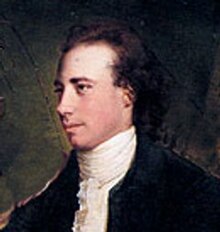Thomas Gisbourne
| Thomas Gisborne | |
|---|---|

detail from Joseph Wright painting
|
|
| Born | 31 October 1758 Bridge Gate, Derbyshire |
| Died | 24 March 1846 (aged 87) |
| Education | Harrow and entered St John's College |
| Occupation | divine |
| Spouse(s) | Mary Babington |
| Children | eight |
| Parent(s) | John and Ann Gisborne |
Thomas Gisborne (31 October 1758 – 24 March 1846) was an English Anglican priest and poet. He was a member of the Clapham Sect, who fought for the abolition of the slave trade in England.
Gisborne was born at Bridge Gate, Derbyshire, the son of John Gisborne of Yoxhall Lodge in Needwood Forest, Staffordshire and his wife Anne Bateman. He was educated at Harrow and entered St John's College, Cambridge in 1776, where he established lifelong friendships with William Wilberforce and Thomas Babington. At Cambridge, he became the first Chancellor's medallist in 1780.
In 1783 he became curate of Barton-under-Needwood, and later that year inherited Yoxall Lodge, Staffordshire, which was 3 miles from the church. The next year he married Mary Babington (b. 1760), only sister of Thomas Babington. They had six sons and two daughters. The eldest son, Thomas Gisborne (1794–1852), became a member of parliament, and the fourth son, James, a clergyman, succeeded his father as perpetual curate of Barton in 1820.
Gisborne was a central figure in the Clapham Sect, an abolitionist group which included William Wilberforce and Gisborne's brother-in-law Thomas Babington. Yoxall Lodge acted as a major focus of the group, and Wilberforce was a frequent visitor there.
Gisborne was appointed prebendary of Durham Cathedral in 1823. He died at Yoxall Lodge on 24 March 1846 at the age of eighty-seven. Gisborne left money for an annual scholarship at the University of Durham, which is referred to as the Gisborne Scholarship.
...
Wikipedia
